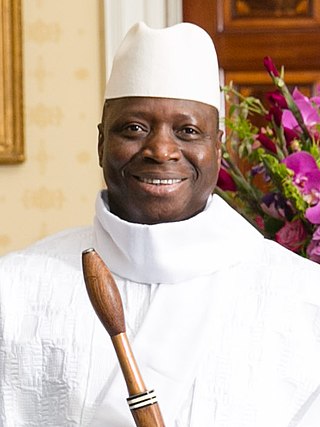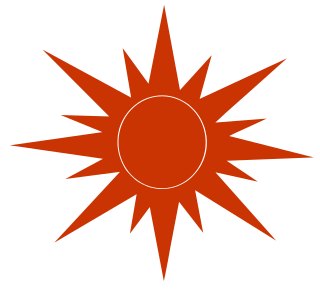Adama Jammeh may refer to:
Adama Jammeh may refer to:

The Gambia, officially the Republic of The Gambia, is a country in West Africa. It is the smallest country within mainland Africa and is surrounded by Senegal, except for its western coast on the Atlantic Ocean. The Gambia is situated on both sides of the lower reaches of the Gambia River, the nation's namesake, which flows through the centre of the Gambia and empties into the Atlantic Ocean, thus the long shape of the country. It has an area of 10,689 square kilometres (4,127 sq mi) with a population of 1,857,181 as of the April 2013 census. Banjul is the Gambian capital and the country's largest metropolitan area, while the largest cities are Serekunda and Brikama.

Politics of The Gambia takes place within the framework of a presidential republic, whereby the President of The Gambia is both head of state and head of government, and of a multi-party system. Executive power is exercised by the government. Legislative power is vested in both the government and parliaments.

The president of the Republic of The Gambia is the head of state and head of government of the Gambia. The president leads the executive branch of the government of the Gambia and is the commander-in-chief of the Gambia Armed Forces. The post was created in 1970, when the Gambia became a republic and has been held by three people: Dawda Jawara, who ruled from 1970 until 1994, Yahya Jammeh, who seized power in a bloodless coup that year and Adama Barrow, who defeated Jammeh in elections held in December 2016.

Yahya Abdul-Aziz Jemus Junkung Jammeh is a Gambian politician and former military officer who was the leader of The Gambia from 1994 to 2017, firstly as chairman of the Armed Forces Provisional Ruling Council (AFPRC) from 1994 to 1996 and then as President of the Gambia from 1996 to 2017.

The United Democratic Party is a political party in the Gambia, founded in 1996 by 3 political parties and choose the human rights lawyer, freedom fighter, ANM Ousainou Darboe to be the party leader and Secretary General. As a candidate in the presidential election of 18 October 2001, he came second with 32.6% of the popular vote; he took second place again in the 22 September 2006 presidential election with 26.7% of the vote. The 17 January 2002 parliamentary election was boycotted by the party. In the 25 January 2007 parliamentary election, the party won four out of 48 seats.

The People's Democratic Organisation for Independence and Socialism (PDOIS) is a socialist political party in the Gambia. Since 2005, it has been part of the National Alliance for Democracy and Development (NADD). It was part of Coalition 2016 in the 2016 presidential election, whose candidate, Adama Barrow, defeated long-time incumbent Yahya Jammeh. The PDOIS also publishes a party newspaper, Foroyaa, which was noted for its opposition to the Jammeh regime.

Islam is the major religion in the Gambia, representing 95% of the 2 million population, with the first Muslim communities in the country arriving in 11th century. Islam has therefore had an influence on the Gambia throughout history, and continues to impact its culture, society and politics. The majority of The Gambia's Muslims are Sunni belonging to the Maliki school of jurisprudence, influenced with Sufism. There is a smaller Shiite community, largely stemming form Lebanese and Arab migration. The Ahmadiyya movement is also present. Other religious societies exist in the country, including Catholics, Protestants, Hindus and Traditional African religions.
Polygamous unions are legally recognized in the Gambia and have been said to be very prevalent. They are frequently considered by the older generations of Gambian men as an indicator of prosperity.

The Constitution of the Gambia is the supreme law of the Republic of the Gambia.
Adama is a Hebrew given name meaning earth or soil, and a Hindu surname.

Adama Jammeh is a Gambian sprinter. He competed in the 200 metres at the 2015 World Championships in Beijing without advancing from the first round.

Presidential elections were held in The Gambia on 1 December 2016. In a surprise result, opposition candidate Adama Barrow defeated long-term incumbent Yahya Jammeh. The election marked the first change of presidency in The Gambia since a military coup in 1994, and the first transfer of power by popular election since independence from the United Kingdom in 1965.

Adama Barrow is a Gambian politician and real estate developer who has served as President of the Gambia since 2017.

The Gambian constitutional crisis occurred following presidential elections in December 2016, in which challenger Adama Barrow achieved an upset victory over longtime incumbent Yahya Jammeh. It eventually concluded after a military intervention by the Economic Community of West African States (ECOWAS) led to Jammeh’s departure from the country.

The ECOWAS military intervention in the Gambia or the ECOWAS Mission in The Gambia – code-named Operation Restore Democracy – is an ongoing military intervention in The Gambia by several member states of the Economic Community of West African States.

United Nations Security Council Resolution 2337 was a measure unanimously adopted by the United Nations Security Council (UNSC) on 19 January 2017. It expressed support for efforts by ECOWAS to peacefully resolve the 2016–2017 Gambian constitutional crisis, calling on President Yahya Jammeh to step down and allow a peaceful transition to the President-elect, Adama Barrow, as well as supporting the African Union and ECOWAS decisions in recognizing Adama Barrow as the new president. The measure was adopted by a vote of 15 supporting, none opposed, and none abstained.
The following lists events in the year 2017 in the Gambia.

Mamadou Tangara is a Gambian diplomat and politician who has served as Minister of Foreign Affairs since 2018, having previously served in 2012 and from 2010–2012. Tangara also served as Gambian Permanent Representative to the United Nations from 2017–2018 and from 2013–2016.
Adama Jammeh is a Gambian professional footballer who plays as a forward for the club Étoile du Sahel.
The First Lady of the Gambia is the official title of the wife of the President or Head of State of The Gambia. Since January 19, 2017, Fatoumatta Bah-Barrow has been First Lady.